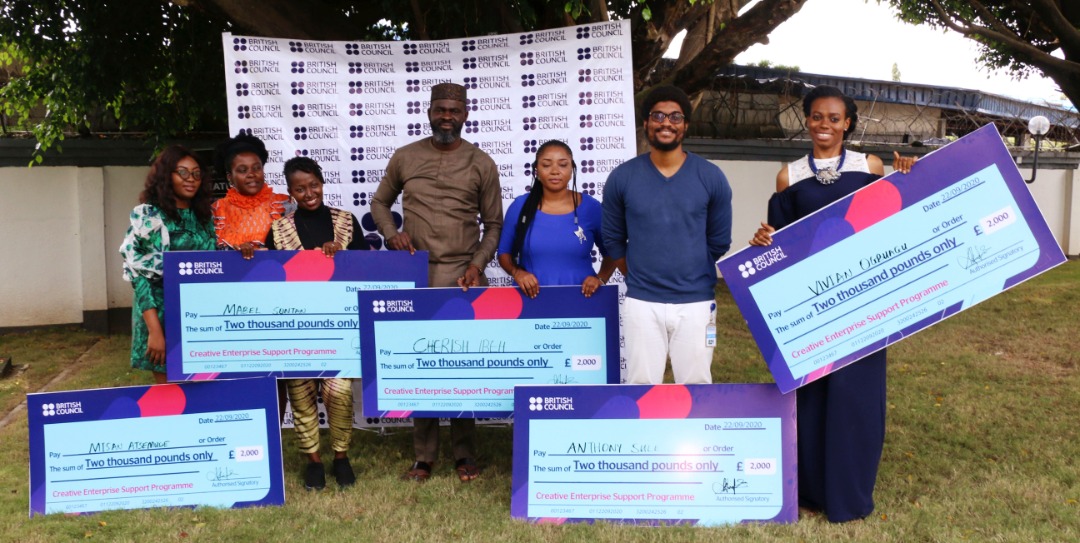Five winners have emerged in the British Council’s Creative Enterprise Support Programme with each winner going home with £2,000 each (N980, 000).
Mrs Uju Dubas-Agbasi, Project Manager, Arts and Creative Economy, British Council, made this known on Wednesday in Lagos.
According to her, the winners are: Cherish Ibeh of Cher Stunner; Vivian Ogbuagu of Handsmithen; Anthony Sule of Antoine Collections; Misan Atsemude of Omali Bridals and Mabel Sontan of Adire Biz Hub.
Dubas-Agbasi, said in a statement, that the grant funding and mentorship of key young players in the fashion industry, was meant to grow business of young Nigerian entrepreneurs in the fashion industry.
She said: ”The Creative Enterprise Support Programme is a programme targeted at young creative who do things on their own but limited in various areas.”
READ ALSO:Civil Liberties Organization Urges INEC to Consolidate on Gains of Edo Polls
The News Agency of Nigeria (NAN) reports that the Creative Enterprise Support Programme is a British Council initiative to support young FashionTech entrepreneurs with training and mentorship to grow their businesses.
It is specifically designed to offer enterprise, artistic, technical and skills training to existing and potential fashion-tech entrepreneurs in Abuja.
The project manager said that the programme kicked off in 2019 with 60 entrepreneurs participating in a two-phased programme, led by experienced professionals working in the fashion industry in Nigeria and the United Kingdom.
She said: “The first phase was a two-week intensive training programme followed by a six months incubation programme for 30 entrepreneurs who made it to the next phase.
“The incubation phase included mentoring, coaching, internships opportunities and much more.
“After 10 months, 10 finalists pitched their businesses, with five of them coming out winners.
“On Monday, the 10 finalists were each given five minutes to make their presentation virtually to the judges of the contest, while the judges used two minutes to give their feedback on the presentations,” Dubas-Agbasi said.
She said that the council trained the young fashion entrepreneur to run their businesses properly and gave them more knowledge and exposure with trainers from Nigerian and the UK to widen their scope.
Dubas-Agbasi said that the training was to help the entrepreneur run their businesses better and make money.
”We know that the creative industry is one of the employers of labour in Nigeria.
“So, we are doing this to help them build that self-confidence, inject the business aspect into what they are doing, and actually run it in a professional way.
”They have not only been trained on how to make clothes, how to make shoes or fashion pieces, but they have also been trained on finances, marketing, packaging and a whole lot of things, and all those things built into a business.
“That’s what the training is all about,” the project manager said.
Dubas-Agbasi said that highlights of the programme included the presentation of cheques to the winners by Idowu Akintade, Procurement Head, West Africa, British Council.
She said that one of the winners, Ogbuagu was selected for a unique business which focussed on fabric wastes being turned into raw materials.
‘’We are trying to build a circular economy around fashion. We are designing our waste entirely from the process.
“So, instead of say, you buy a necklace and want to throw it away, you can bring it to us and make something else out of it.
“I believe that, with that, once you have an endless supply of raw materials, you are bound to grow. And we have a good target market too,” the project manager quoted Ogbuagu as saying.
Dubas-Agbasi added that another winner, Anthony produced bespoke and ready-to-wear footwears for Nigerian millennial.
”I have worked with a lot of wonderful entrepreneurs since we started, right from when we were 60 and down to 10. We were all excellent and we are all winners.” Dubas-Agbasi quoted Anthony as saying.
On challenges faced by small scale fashion entrepreneurs in the country, Anthony said: ”I will say recognition.
“Prior to the CESP programme, personally, I was faced with the issue of being recognised. You have a lot of people look down on you when you introduce your business.
“But, the programme made us understand that you have a lot to offer and your office can be heard. I feel like we need more recognition in the fashion business.”



Leave a Reply